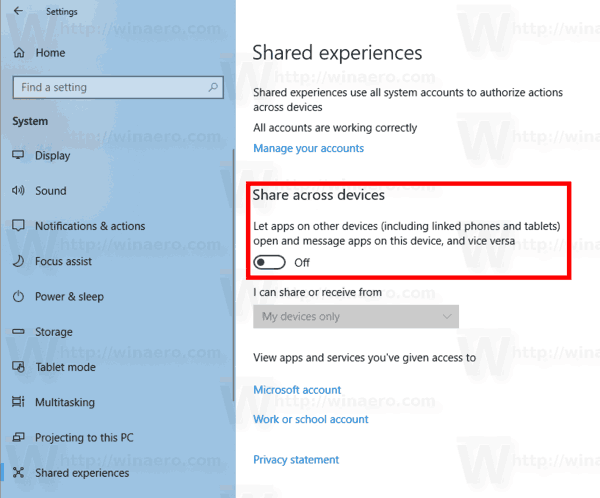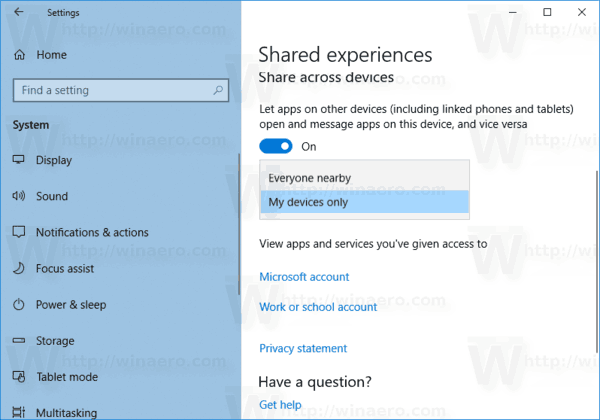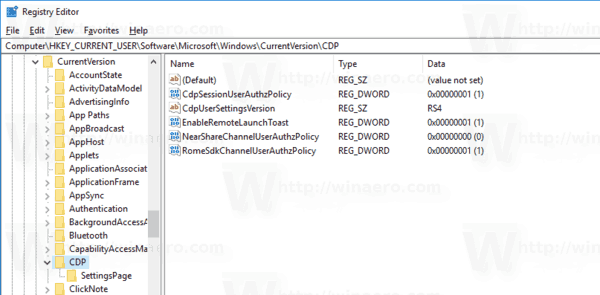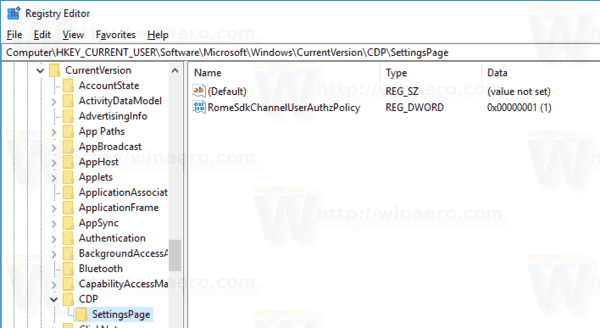Starting with Windows 10 version 1607 "Anniversary Update", Windows 10 includes a new feature that allows apps on your device to communicate with other devices and open the same apps on them. This will allow you to continue your work faster when you change your device. This feature provides synchronization between apps installed on your Windows 10 PC and other devices, saving your time.
Advertisеment
The feature can be found under Settings - System - Shared experiences. It was codenamed "Project Rome", and has got a number of visual refinements during its life span. The final version allows app sharing between devices you own only, or other devices around you.
In its current version, the Shared experiences platform provides the Remote Systems API, enabling developers to extend their app experiences across Windows devices connected proximally or through the cloud. This blog post explains some basic ideas and expresses code examples.
By default, the Shared experiences feature is enabled in Windows 10. This makes app synchronization possible between devices. If you are not happy with this feature, here is how to disable it.
To disable App Synchronization between devices in Windows 10, do the following.
- Open Settings.
- Navigate to System - Shared experiences.
- On the right, turn off the toggle option Share across devices.

You are done.
Alternatively, you can change the configuration of Shared experiences. When enabled, you can select either My devices only or Everyone nearby under I can share or receive from.

Use the links, Microsoft account and Work or school account under View apps and services you've given access to.
Finally, everything above can be customized with a Registry tweak.
To change options of the Shared experiences feature, do the following.
Set App Sharing to 'My devices only' with a Registry tweak
- Open the Registry Editor app.
- Go to the following Registry key.
HKEY_CURRENT_USER\Software\Microsoft\Windows\CurrentVersion\CDP
See how to go to a Registry key with one click.
- On the right, modify or create a new 32-Bit DWORD value CdpSessionUserAuthzPolicy.
Note: Even if you are running 64-bit Windows you must still create a 32-bit DWORD value.
Set its value data to 1 to set app sharing to "My devices only". - Repeat the same for the value NearShareChannelUserAuthzPolicy.
- Repeat the same for the value RomeSdkChannelUserAuthzPolicy.

- Now, go to the key
HKEY_CURRENT_USER\Software\Microsoft\Windows\CurrentVersion\CDP\SettingsPage
- Change the value 32-bit DWORD value RomeSdkChannelUserAuthzPolicy to 1.

- To make the changes done by the Registry tweak take effect, you need to sign out and sign in to your user account.
Set App Sharing to 'Other devices' with a Registry tweak
Under the key HKEY_CURRENT_USER\Software\Microsoft\Windows\CurrentVersion\CDP , set the value data for the valuesCdpSessionUserAuthzPolicy to 2, NearShareChannelUserAuthzPolicy to 1, and RomeSdkChannelUserAuthzPolicy to 2.
Under the key HKEY_CURRENT_USER\Software\Microsoft\Windows\CurrentVersion\CDP\SettingsPage, set the value RomeSdkChannelUserAuthzPolicy to 2.
Disable Shared experiences with a Registry tweak
Under the key HKEY_CURRENT_USER\Software\Microsoft\Windows\CurrentVersion\CDP , set the value data for the valuesCdpSessionUserAuthzPolicy to 0, NearShareChannelUserAuthzPolicy to 0, and RomeSdkChannelUserAuthzPolicy to 0.
That's it.
Support us
Winaero greatly relies on your support. You can help the site keep bringing you interesting and useful content and software by using these options:
